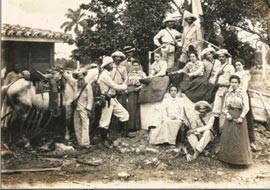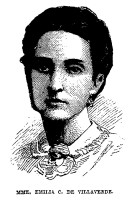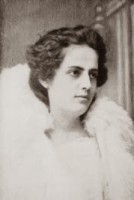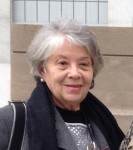
A groundbreaking presentation by historian Raquel Vinat on the pivotal role played by Cuban women during colonial times and the early decades of the 20th century, featuring archival photographs and documents shown in public for the first time. Prof. Vinat focuses on three women
—Ana Josefa Agüero, Emilia Casanova Rodríguez, and Evangelina Cosío Cisneros—
who have traditionally been considered atypical by conventional historians. Yet Prof. Vinat’s in-depth research sheds light on the similarities and particular characteristics that defined female attitudes and activism during three diferent stages in the Island’s struggle for independence in the 19th century—both inside Cuba and while in exile in New York—and, within this context,
Yet Prof. Vinat’s in-depth research sheds light on the similarities and particular characteristics that defined female attitudes and activism during three diferent stages in the Island’s struggle for independence in the 19th century—both inside Cuba and while in exile in New York—and, within this context,  analyzes the unusual and patriotic militancy of these three women, its social impact and its toll on their personal lives. Further probing into the standard historiography on the era also reveals a concerted effort to diminish their very significant contribution and confine them to the realm of invisibility.
analyzes the unusual and patriotic militancy of these three women, its social impact and its toll on their personal lives. Further probing into the standard historiography on the era also reveals a concerted effort to diminish their very significant contribution and confine them to the realm of invisibility.
[Top photograph: Mambisas or female insurgents in the battlefield; pictured right: Emilia Casanova, wife of abolitionist novelist
Cirilo Villaverde; pictured left: Evangelina Cosío de Cisneros]
Prof. Vinat will be presented by Iraida Iturralde, director of programming of the Cuban Cultural Center of New York.
The lecture will be in Spanish. Reception to follow.
BARUCH COLLEGE
The Newman Library
151 East 25th St., ROOM 750
off Lexington Ave. NYC
RSVP at: cccofny@aol.com
Raquel Vinat Mata is Researcher Emerita of Havana’s Instituto de Historia. A scholar on 19th century Cuba, she is the author of four books on the lives and legacy of Cuban women under colonial rule and the early years of the Republic: Obrerismo  femenino en la industria cubana de la aguja; Luces en el silencio; Las cubanas en la posguerra; and Después de la guerra: ¿la paz? In 1983 she co-founded the Chair for Gender Studies at the University of Havana. Her all-encompassing doctoral thesis on the emergence and trajectory of the Cuban feminist movement in the 19th century remains unpublished, as well as four other books on key aspects of women’s role in Cuban society: Sociabilidad femenina cubana: asociacionismo y liderazgo en el siglo XIX; La mujer normada: redes de opresión y alternativas de resistencia; Presencia femenina en las publicaciones cubanas del siglo XIX; and Vida y acción de las cubanas durante la Reconcentración. During her tenure at the Instituto de Historia, and presently as an independent researcher, she has uncovered invaluable documentation that sheds new light on the social and political consciousness of women in 19th century Cuba. These not only include first-hand testimonials by white women, but also by slave and free black women. Prof. Vinat’s articles on related topics, including dance and gender, the female musical discourse, religion, woman and the family, cultural identity, and racism have appeared in scholarly journals in Cuba, Mexico, Venezuela, the Dominican Republic, and Spain.
femenino en la industria cubana de la aguja; Luces en el silencio; Las cubanas en la posguerra; and Después de la guerra: ¿la paz? In 1983 she co-founded the Chair for Gender Studies at the University of Havana. Her all-encompassing doctoral thesis on the emergence and trajectory of the Cuban feminist movement in the 19th century remains unpublished, as well as four other books on key aspects of women’s role in Cuban society: Sociabilidad femenina cubana: asociacionismo y liderazgo en el siglo XIX; La mujer normada: redes de opresión y alternativas de resistencia; Presencia femenina en las publicaciones cubanas del siglo XIX; and Vida y acción de las cubanas durante la Reconcentración. During her tenure at the Instituto de Historia, and presently as an independent researcher, she has uncovered invaluable documentation that sheds new light on the social and political consciousness of women in 19th century Cuba. These not only include first-hand testimonials by white women, but also by slave and free black women. Prof. Vinat’s articles on related topics, including dance and gender, the female musical discourse, religion, woman and the family, cultural identity, and racism have appeared in scholarly journals in Cuba, Mexico, Venezuela, the Dominican Republic, and Spain.
Iraida Iturralde is an award-winning poet, editor, and translator,  and, for the last 19 years, has played a leading role in the preservation and promotion of Cuban culture in New York City. She studied political science at NYU and Columbia, and has taught social sciences and languages at various colleges. She has co-founded two literary magazines, and has published five poetry books, including the critically acclaimed La isla rota. Her poem, “The Loss of Innocence,” was commissioned by PBS for its special, New Yorkers Remember September 11, hosted by Walter Cronkite. Iturralde’s extensive work as a translator includes poems by María Elena Cruz Varela and José Triana. Her poetry, in both English and Spanish, has appeared in literary journals in Latin America, Europe and the U.S., and has been included in several anthologies, most recently in Mark Weiss’ The Whole Island.
and, for the last 19 years, has played a leading role in the preservation and promotion of Cuban culture in New York City. She studied political science at NYU and Columbia, and has taught social sciences and languages at various colleges. She has co-founded two literary magazines, and has published five poetry books, including the critically acclaimed La isla rota. Her poem, “The Loss of Innocence,” was commissioned by PBS for its special, New Yorkers Remember September 11, hosted by Walter Cronkite. Iturralde’s extensive work as a translator includes poems by María Elena Cruz Varela and José Triana. Her poetry, in both English and Spanish, has appeared in literary journals in Latin America, Europe and the U.S., and has been included in several anthologies, most recently in Mark Weiss’ The Whole Island.
This lecture is part of our Women’s History Month celebration and is presented in association with the Department of Modern Languages and Comparative Literature of Baruch College at CUNY, and is made possible by a grant from the PAUL ANDRE FEIT MEMORIAL FUND of Baruch College.


With the promotional collaboration of
 and
and 